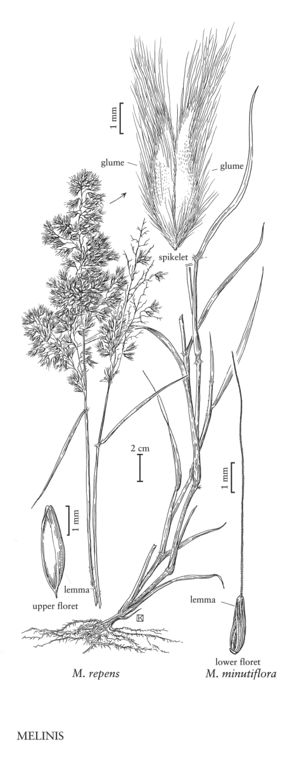Difference between revisions of "Melinis minutiflora"
FNA>Volume Importer |
imported>Volume Importer |
||
| (4 intermediate revisions by 2 users not shown) | |||
| Line 4: | Line 4: | ||
|publications= | |publications= | ||
|common_names=Molasses grass | |common_names=Molasses grass | ||
| + | |special_status={{Treatment/ID/Special_status | ||
| + | |code=I | ||
| + | |label=Introduced | ||
| + | }} | ||
|basionyms= | |basionyms= | ||
|synonyms= | |synonyms= | ||
| Line 17: | Line 21: | ||
-->{{Treatment/Body | -->{{Treatment/Body | ||
|distribution=Puerto Rico;Pacific Islands (Hawaii);Fla. | |distribution=Puerto Rico;Pacific Islands (Hawaii);Fla. | ||
| − | |discussion=<p>Melinis minutiflora is native to Africa, but has been introduced throughout the tropics as a forage crop. It is now regarded as a serious weed in many places. In the Flora region, it is only known to be established in southern Florida.</p> | + | |discussion=<p><i>Melinis minutiflora</i> is native to Africa, but has been introduced throughout the tropics as a forage crop. It is now regarded as a serious weed in many places. In the Flora region, it is only known to be established in southern Florida.</p> |
|tables= | |tables= | ||
|references= | |references= | ||
| Line 26: | Line 30: | ||
-->{{#Taxon: | -->{{#Taxon: | ||
name=Melinis minutiflora | name=Melinis minutiflora | ||
| − | |||
|authority=P. Beauv. | |authority=P. Beauv. | ||
|rank=species | |rank=species | ||
| Line 33: | Line 36: | ||
|basionyms= | |basionyms= | ||
|family=Poaceae | |family=Poaceae | ||
| − | |illustrator=Linda A. Vorobik | + | |illustrator=Linda A. Vorobik;Karen Klitz |
| + | |illustration copyright=Utah State University | ||
|distribution=Puerto Rico;Pacific Islands (Hawaii);Fla. | |distribution=Puerto Rico;Pacific Islands (Hawaii);Fla. | ||
|reference=None | |reference=None | ||
|publication title= | |publication title= | ||
|publication year= | |publication year= | ||
| − | |special status= | + | |special status=Introduced |
| − | |source xml=https:// | + | |source xml=https://bitbucket.org/aafc-mbb/fna-data-curation/src/200273ad09963decb8fc72550212de541d86569d/coarse_grained_fna_xml/V25/V25_1308.xml |
|subfamily=Poaceae subfam. Panicoideae | |subfamily=Poaceae subfam. Panicoideae | ||
|tribe=Poaceae tribe Paniceae | |tribe=Poaceae tribe Paniceae | ||
Latest revision as of 17:56, 11 May 2021
Plants perennial; cespitose; aromatic. Culms (50)80-150 cm, branching and sprawling, often becoming matted, usually rooting at the lower nodes; upper nodes appressed pubescent; internodes glabrous basally, appressed pubescent distally. Sheaths densely tomentose, hairs 0.5-5.2 mm, spreading, papillose-based, often sticky and smelling of linseed oil; ligules of hairs, 1-2 mm; blades 3.5-19 cm long, 4-14 mm wide, flat, pubescent, hairs sometimes papillose-based. Panicles (4.5)7-20 cm long, 1-9.5 cm wide, narrowly ovate; primary branches to 8 cm; pedicels usually shorter than the spikelets, glabrous, scabridulous. Spikelets 1.7-2.4 mm, usually purplish; calluses glabrous. Lower glumes absent or to 0.3 mm, glabrous, scabridulous; upper glumes 1.6-2.4 mm, glabrous, unawned, sometimes muticous; lower florets sterile; lower lemmas bilobed, lobes 0.2-0.7 mm, unawned or awned, awns to 18 mm; lower paleas absent; upper lemmas 1.4-1.9 mm, glabrous; upper paleas 1.5-1.9 mm, usually slightly longer than the upper lemmas; anthers 3, 1-1.5 mm, reddish-brown to orange. Caryopses 0.9-1.2 mm long, 0.3-0.4 mm wide. 2n = 36.
Distribution
Puerto Rico, Pacific Islands (Hawaii), Fla.
Discussion
Melinis minutiflora is native to Africa, but has been introduced throughout the tropics as a forage crop. It is now regarded as a serious weed in many places. In the Flora region, it is only known to be established in southern Florida.
Selected References
None.
